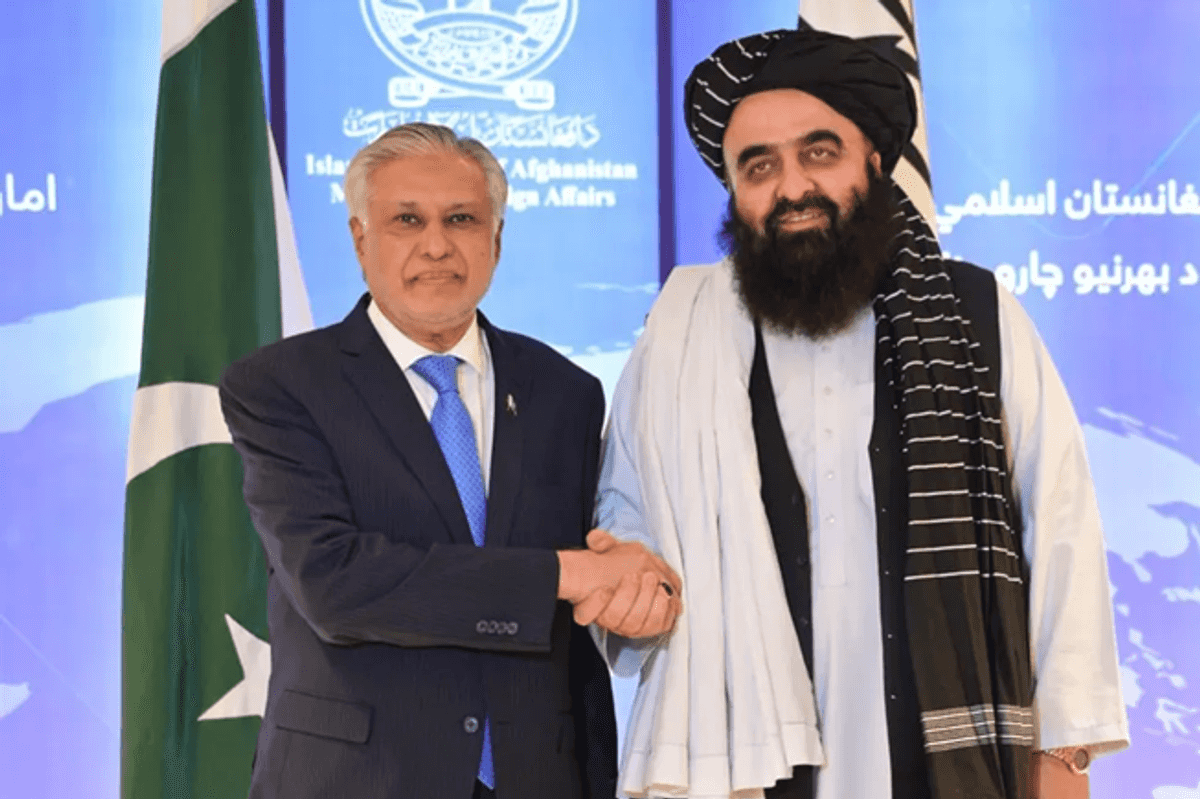Pakistan’s deportation drive softens in tone, not in action
Afghan foreign minister stressed need for a respectful and humane repatriation process at meeting with Pakistan's DPM Dar

Asma Kundi
Producer, Islamabad
Asma Kundi is a multimedia broadcast journalist with an experience of almost 15 years. Served national and international media industry as reporter, producer and news editor.

Pakistan’s Deputy Prime Minister Ishaq Dar met with Acting Afghan Foreign Minister Amir Khan Muttaqi in Kabul on Saturday, as part of a series of high-level meetings during his day-long visit to the Afghan capital.
Pakistan MOFA
Despite a diplomatic thaw following Deputy Prime Minister and Foreign Minister Ishaq Dar’s recent visit to Kabul, Pakistan’s crackdown on undocumented Afghan nationals continues largely unchanged on the ground.
While police raids appear to have slowed in some areas, the broader deportation campaign presses on, with thousands of Afghans still held in detention centers and the government's overall policy intact.
During the Kabul meeting last weekend, Afghanistan’s acting Foreign Minister Amir Khan Muttaqi expressed “deep concern” over the forced deportation of Afghan migrants, emphasizing the need for a respectful and humane repatriation process.
In response, the Pakistani government announced the establishment of a Federal Control Room—known as the IFRP Helpline—at the National Crisis Information Management Cell (NCIMC) to address harassment complaints during repatriation.
An ‘old’ helpline, rebranded
However, Nukta found that the helpline is not a new initiative.
“This helpline has been operational since the first phase of the Afghan deportation campaign,” an official told Nukta on condition of anonymity. “Back then, we received around 2,000 calls.”
Since the beginning of the second phase on April 1, 2025, the helpline has received approximately 1,200 calls. Of these, nearly half came from Pakistani citizens reporting Afghan residents in their neighborhoods—even those holding valid Afghan Citizen Cards (ACC)—and requesting their eviction.
Around 200 ACC holders also reached out for assistance. However, due to government policy requiring their departure, the helpline cannot support them.
With four other helplines already operational in provincial and federal ministries, it remains unclear how this new system will coordinate with existing ones or whether it will bring tangible improvements—raising concerns that the move may be more symbolic than effective.
Police raids ease, but detentions continue
Some Afghan residents say they’ve noticed a visible drop in police harassment following Dar’s trip.
An Afghan man living in Tarnol, a suburban area on the outskirts of Islamabad and a Proof of Registration (POR) card holder, told Nukta that police raids on Afghan homes have decreased by nearly 90% since the visit.
Another Afghan resident in Rawalpindi echoed the observation. He said local police previously conducted frequent raids, detaining even those with valid documentation. Now, he said, such incidents have “significantly decreased.”
Legal aid groups see slight relief
Moniza Kakar, a lawyer and human rights activist who provides legal aid to Afghan nationals, confirmed that harassment has eased somewhat in Karachi and Punjab.
However, she emphasized that many Afghans remain in detention. She added that due to the humiliation and mistreatment suffered in recent months, many are now choosing to leave Pakistan voluntarily.
Why not adopt them?
Political and defense analyst Imtiaz Gul warned that Pakistan’s current approach is short-sighted and risks long-term damage to its relationship with Afghanistan.
“The process of detaining and deporting Afghans is breeding resentment,” he said. “That inevitably influences political thinking in Kabul.”
Gul urged the state to shift toward a more humane and strategic policy, including extending repatriation timelines and considering naturalization for Afghans born and raised in Pakistan.
“Why not adopt them?” he asked. “Many of these people are already embedded in our economy.”
He argued that instead of focusing solely on expulsions, Pakistan should see an opportunity to build goodwill ambassadors among Afghan residents who could carry positive narratives about Pakistan back to Kabul and Kandahar.
Gul also highlighted the ethical dilemma of deporting people who have never even lived in Afghanistan.
“Pakistan’s insistence on sending back all Afghans contradicts globally accepted norms—such as offering citizenship to long-term residents or those born in the host country,” he said.
'Dignified Exit'
Qadir Yar Tiwana, Director General of Media at the Interior Ministry, told Nukta that Pakistan remains committed to ensuring a “dignified exit” for Afghan nationals.
“We’ve set up proper holding centers with medical facilities and essential services,” he said. “There are helplines at both federal and provincial levels to report mistreatment, and we act on such complaints.”







Comments
See what people are discussing